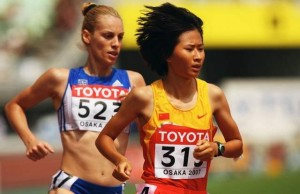Illegal substance users getting caught before games…
By Associated Press
MONACO— Nine track athletes were suspended ahead of the London Olympics for doping, including three who were caught in retests of samples from last year’s world championships, the IAAF said Wednesday.

The governing body said six were caught in biological passport tests, which measure changes in an athlete’s blood profile. The others were sanctioned after retroactive testing of blood and urine samples from the worlds in Daegu, South Korea.
Eight of the athletes received two-year suspensions, while one was handed a four-year ban.
The IAAF said the athletes — eight women and one man — were involved in “sophisticated doping,” including one case of human growth hormone and two of synthetic testosterone.
Among those suspended was Ukraine’s Nataliya Tobias, who won a bronze medal in the 1,500 meters at the 2008 Beijing Olympics. She tested positive for testosterone in further analysis of urine samples from Daegu, where she finished ninth in the 1,500.
Another Ukrainian athlete, 400-meter runner Antonina Yefremova, also was later caught for using testosterone in Daegu. She was eliminated in the semifinals.
The IAAF said the two Ukrainians were caught after suspicious blood samples taken at the worlds led to further checks on the urine samples they provided at their team training camp in Korea.
The IAAF said Bulgarian sprinter Inna Eftimova, who was eliminated in the 100-meter heats in Daegu, tested positive for synthetic growth hormone.
“This is the second finding of growth hormone in athletics and one of only a very few to date in sport as a whole,” the IAAF said.
Eftimova, Tobias and Yefremova all received two-year bans after admitting to doping and waiving their right to having their backup “B” sample tested.
In the six biological passport cases, the highest-profile athlete is Moroccan marathon runner Abderrahim Goumri, who has been a runner-up at the Chicago, London and New York marathons and won the Seoul International Marathon in 2011.
Goumri was banned for four years by the Moroccan Athletic Federation until March 2016, but the IAAF said the penalty is “not final under IAAF rules” and can still be appealed by the athlete.
The five other athletes are Greek steeplechaser Irini Kokkinariou, Turkish distance runner Meryem Erdogan and Russian long-distance runners Svetlana Klyuka, Nailiya Yulamanova and Yevgenina Zinurova.
All six athletes had been flagged as suspicious and regularly targeted by the IAAF since 2009.
The Ethiopian-born Erdogan and the three Russians admitted doping and received two-year bans, the IAAF said.
Kokkinariou was suspended for two years by the Greek Athletics Federation. The IAAF has appealed to the Court of Arbitration for Sport seeking a four-year ban on the grounds of aggravating circumstances.







